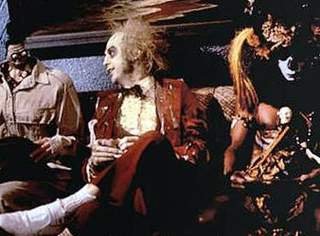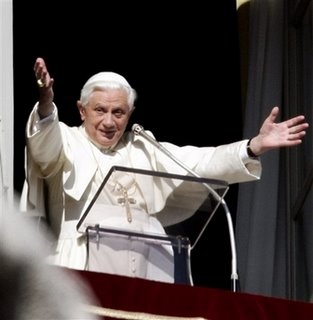
Whether it's been the office of a doctor, lawyer, indian chief (or even the bishop), we've all been there before. The waiting room. Sometimes, just to add to the anxiety, there's the faint sound of a dentist's drill, or the muffled, behind the closed doors laugh of workers you're sure are giggling because they're preparing to cause you pain, or perhaps taking bets on how long they can make you sit there before your breaking point. Waiting rooms are a place to do nothing but sit and ponder what will happen next. In it, we are powerless. We sit there, not knowing whether our turn will come in one minute or one hour. In a lesson we've all learned at one time or another, neither complaining about our wait-time nor staring at the clock on the wall will make the time go any faster. Instead, we sit and hope there's someone in there who'll have pity on us and let us in. Until then, we sit with everyone else and wait, and wait, and wait.
Today the Church remembers ("commemorates", technically) all the faithful departed. Yesterday, we honored those who've died and are in the eternal presence of the Trinity in Heaven: the holy ones, the Sancti, the Saints. Yesterday we prayed
to these holy men and women, asking them to intercede on our behalf and help us live good, holy lives on earth. Today our thoughts turn to those who've died and are not yet ready to enter the presence of God, and, unlike yesterday, when we pray today we pray
for them. They've come with some sins on their souls. A little bit of baggage that needs to be reconciled. Not enough to deny them the pearly gates, but enough that they're in need of a supernatural makeover. If you get that, then you understand the concept of the place we traditionally call "Purgatory".
Purgatory has been called "Heaven's waiting room." The idea behind it being that we're going to get into Heaven, but first we've got to settle some supernatural issues. What we call it isn't important. The bottom line revolves around 2 things: First, the Church's teaching on Purgatory was never "supressed" or done away with in the age of Vatican II (if you don't believe me, check out questions
210 & 211 in the 2006 Catechism Compendium, which points you back to questions
1030-1032 of the 1995 Catechism). Second, even if you don't buy into the whole "dogma" of it all, the bottom line is that Purgatory makes sense. Every one of us has, at one time or another, gone to some big event: the prom, a wedding, the Oscars (well, not me, but maybe you). What do we do? We prepare. We shower and shave and gargle and wonder what we're going to wear, all for that "big night" that will last a few hours. Now, think of what Heaven is (here's a
refresher) and realize that we'll be there for all eternity and for all eternity we'll be in the presence of God the Father, Jesus Christ, The Blessed Virgin Mary, all the angels, all the Saints. A most impressive party, and Purgatory gets us ready for the A-List party that will never end.
So on All Souls Day, and for the whole month of November (as the Church recommends to us), we take some extra time to pray for those sitting in that waiting room, powerless to get themselves out and hoping that someone on the other side of the door will pull some strings and get them inside. Why? Because some day you and I could be in that waiting room, and then we're going to need someone praying for us. During this month of November, every time you pass a cemetery along the road, say a quick little prayer for the folks buried there. Some day one of them (maybe one that
you prayed into Heaven) may return the favor when it's your turn in the waiting room.

Besides, depending on who you're sitting next to, you may not wanna spend too much time waiting.
 Today's Feast of the Apostle St. Andrew always has a special place in my heart because of the two years I spent at St. Andrew's Hall, the College Seminary at Seton Hall University. In fact, the picture here is from my own personal stash; this statue of St. Andrew can be found in the chapel of the college seminary; his right arm is holding a miniature of the seminary building. I can remember how the thought of spending two years there seemed like such a long time. Then I finished that and spent four very fast years at Mount St. Mary's Seminary. Now, it's been a little over eight years since I left Emmitsburg, and it is almost unthinkable that it's been that long.
Today's Feast of the Apostle St. Andrew always has a special place in my heart because of the two years I spent at St. Andrew's Hall, the College Seminary at Seton Hall University. In fact, the picture here is from my own personal stash; this statue of St. Andrew can be found in the chapel of the college seminary; his right arm is holding a miniature of the seminary building. I can remember how the thought of spending two years there seemed like such a long time. Then I finished that and spent four very fast years at Mount St. Mary's Seminary. Now, it's been a little over eight years since I left Emmitsburg, and it is almost unthinkable that it's been that long.




























 Whether it's been the office of a doctor, lawyer, indian chief (or even the bishop), we've all been there before. The waiting room. Sometimes, just to add to the anxiety, there's the faint sound of a dentist's drill, or the muffled, behind the closed doors laugh of workers you're sure are giggling because they're preparing to cause you pain, or perhaps taking bets on how long they can make you sit there before your breaking point. Waiting rooms are a place to do nothing but sit and ponder what will happen next. In it, we are powerless. We sit there, not knowing whether our turn will come in one minute or one hour. In a lesson we've all learned at one time or another, neither complaining about our wait-time nor staring at the clock on the wall will make the time go any faster. Instead, we sit and hope there's someone in there who'll have pity on us and let us in. Until then, we sit with everyone else and wait, and wait, and wait.
Whether it's been the office of a doctor, lawyer, indian chief (or even the bishop), we've all been there before. The waiting room. Sometimes, just to add to the anxiety, there's the faint sound of a dentist's drill, or the muffled, behind the closed doors laugh of workers you're sure are giggling because they're preparing to cause you pain, or perhaps taking bets on how long they can make you sit there before your breaking point. Waiting rooms are a place to do nothing but sit and ponder what will happen next. In it, we are powerless. We sit there, not knowing whether our turn will come in one minute or one hour. In a lesson we've all learned at one time or another, neither complaining about our wait-time nor staring at the clock on the wall will make the time go any faster. Instead, we sit and hope there's someone in there who'll have pity on us and let us in. Until then, we sit with everyone else and wait, and wait, and wait.




